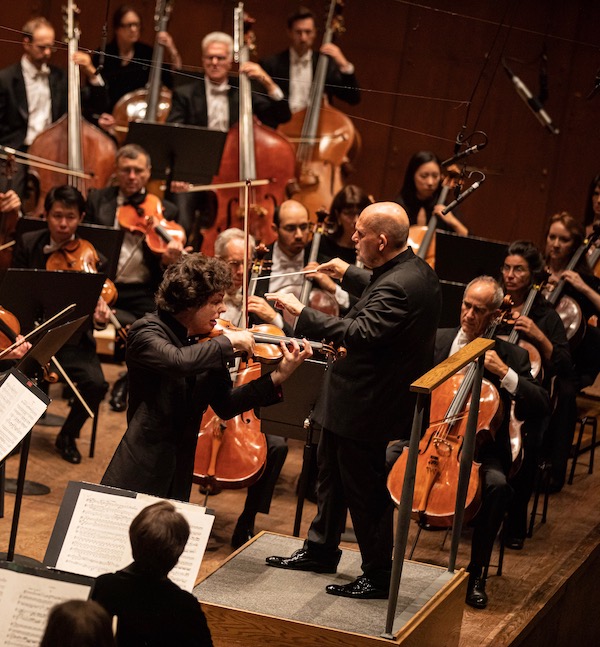Memorably individual Sibelius from Hadelich with the Philharmonic

Jaap van Zweden and the New York Philharmonic are presenting classics of the symphonic repertoire this week, a tidy program of two pieces that, taken together, open up vast possibilities: Sibelius’ Violin Concerto, with Augustin Hadelich as soloist, and the Symphonie fantastique by Berlioz. Yet the experience of Thursday night’s opening concert in David Geffen Hall came off as a bit less than the sum of its parts.
The first half however, with the Sibelius concerto, exceeded most concert experiences. Music like this is not necessarily about something, although the changing moods and the sense of transformation through time—especially the journey from darkness to light—are fair to hear as familiar narrative. Still, someone has to get up there and play the thing in a way that makes it sound like a fresh and coherent story.
That is just what Hadelich did. The soloist played everything with a purpose—he had clear ideas about where the music should go and how it would get there. Sibelius provides a map to musicians, one with certain landmarks, and it’s up to the player to find what surprises and treasures lie in the territory.
Anne-Sophie Mutter, a master of this piece, plays it with a mercurial tone and timbre, a taut psychological jumble. Hadelich, against feathery Philharmonic strings, opened with a feeling of loneliness. To the soloist’s through-line, he added complexity through details, small and natural inflections of phrasing and rhythm. These had an abstract vocal quality and opened up a feeling of deep intimacy. Rather than the beauty of the music sitting at an observable distance, Hadelich made this personal, a quiet and revealing narrative.
Despite the big, resonant high points of the concerto, quiet was the watchword. The Philharmonic’s balances were precise even with the orchestra having a beefy sound. Hadelich doesn’t have an enormous tone—his violin is more like a hot wire, slicing through every obstacle in his path. His instrument shone in the middle of everything, holding the music in his hands like something exquisite and special.
He followed this moving, wonderful performance with Ruggiero Ricci’s arrangement of Francisco Tarrega’s Recuerdos de la Alhambra, which was delicate, dancing, and virtuosic with being show-offy.
The Symphonie fantastique performance was also virtuosic, but that alone wasn’t enough to make it great or especially memorable. The orchestra’s verve was outstanding, and the physical intensity and energy of their playing was often spectacular, especially at the conclusion, which had real thrills.
But the thrills were those of an action movie, fun while they go on but dry and unsatisfying in the end, a kind of musical sugar rush. This was Berlioz without any oddness or weirdness, no real presence of the composer.
Hadelich’s greatness more than compensated for a lack of atmosphere in the Sibelius. Without that in the second half, one was dazzled but not moved, nor impressed. This symphony’s fantastical scenario is an opium-induced fantasy, with literal reveries, love, loss, obsessions, and even terrors.
There was too much slashing, which was exciting in a superficial way but cut every idea to ribbons before it could develop. The first movement reveries never built a palpable feeling. “Un Ball” did work well, the pure energy of the playing here sufficient to make that into a real experience. But the “Scène aux champs,” left no imprint, as if rendered in a paint-by-numbers landscape.
As there was no believable start to the story, the “Marche au supplice” and “Songe d’une nuit du sabbat,” for all the force, never had real tension and release. His forces may be grand, but Berlioz is opening his heart and mind to the listener—neither of which were present in this oddly unsatisfying performance.
The program will be repeated 2 p.m. Friday and 8 p.m. Saturday. nyphil.org